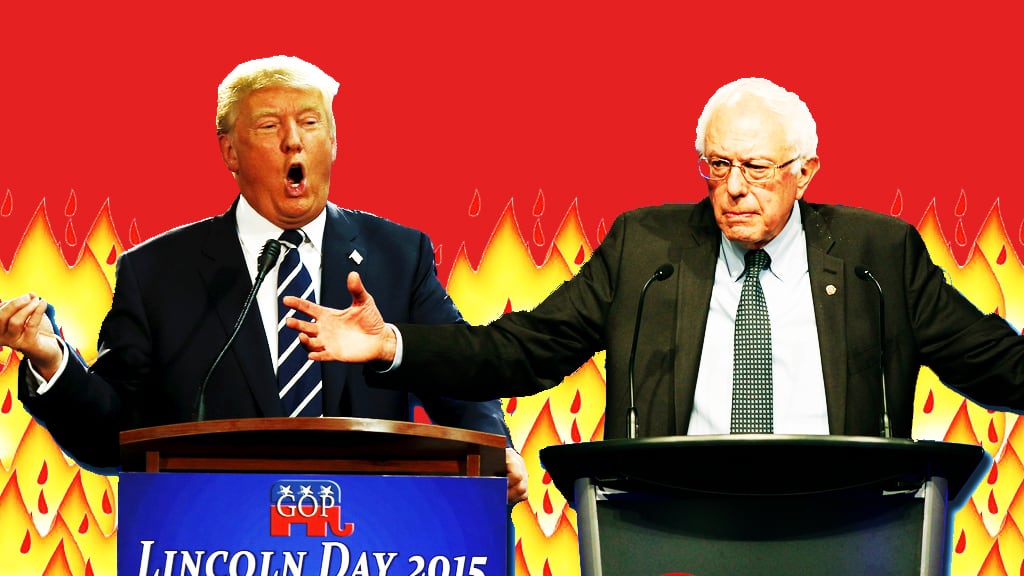Apart from surprising popularity, weird hair, and zero chance at actually becoming president, Donald Trump and Bernie Sanders could hardly seem more different. One’s a socialist-hating billionaire and the other is a billionaire-hating socialist, right? Yet there they are, delivering boffo poll numbers long after everyone in the smart set had written them off as flashes in the pan.
Perhaps, like Austin Powers and Dr. Evil, they’re not so different after all. Indeed, the unanticipated appeal of Trump and Sanders to Republican and Democratic primary voters comes from the same psychological wellspring. They represent, in the words of Pittsburgh Tribune-Review columnist Salena Zito, “populism born of frustration.” They are angry candidates, bitching and moaning about the sorry shape of the United States and they are unabashedly protectionist. Each identifies immigrants and overseas competition as the root cause of most if not all of our problems. They both believe that if only we can wall off the country—literally in The Donald’s case and figuratively in Sanders’—we could “Make America Great Again!” (as Trump puts it in his campaign slogan).
Trump notoriously looks at Mexicans sneaking across the border and sees crime lords, drug dealers, and rapists, though he has magnamimously granted that “some, I assume, are good people.” Sanders, for his part, looks at the same hard cases and sees a reserve army of future wages slaves for the Koch brothers.
In an interview with Vox, Sanders was asked what he thought about increasing immigration in order to help poor foreigners increase their standard of living. “That’s a Koch brothers proposal,” he huffed, “That’s a right-wing proposal, which says essentially there is no United States.” So much for the internationalism and universal brotherhood on which socialism once prided itself.
Being anti-immigrant isn’t a new position for Sanders. As Politico noted earlier this year, Sanders’s loyalty to the AFL-CIO and other labor unions undergirds his consistent opposition to opening up borders and his contempt for free-trade agreements.
In regularly complaining about China, Sanders sounds just like…Donald Trump. Riffing in post-industrial Michigan on August 11, Trump noted China’s currency devaluation and announced, “Devalue means, suck the blood out of the United States!”
For good measure, Trump also attacked Sanders as a weakling even as he saluted him as a brother in spirit. Commenting on how the Vermont senator lost the microphone to a Black Lives Matter activist at a recent event in Seattle, Trump said, “I felt badly for him, but it showed that he was weak. You know what? He’s getting the biggest crowds, and we’re getting the biggest crowds. We’re the ones getting the crowds.”
Indeed, they are. Even after gracelessly implying Fox News moderator Megyn Kelly suffered from PMS during the first Republican candidates’ debate, Trump leads among GOP voters with 23 percent and Sanders has “surged” ahead of Hillary Clinton in New Hampshire polls.
Despite this, there’s no chance either will win his party’s nomination, much less become president. As Jack Shafer has noted, they are less candidates and more demagogues, who trade in “anger and resentment to attract supporters.” Such intensity can get you a hard-core band of supporters—just ask George Wallace or Ross Perot—but it also ultimately limits the broad-based support necessary to pull enough votes even in hotly contested three-way elections.
Which isn’t to say that Trump and Sanders haven’t already had a major impact. In the early stages of the campaign, they are tapping into immense voter dissatisfaction with not just the Republican and Democratic Party establishments but a 21st-century status quo that is in many ways genuinely depressing and disappointing. Trump and Sanders offer seemingly authentic responses to and truly simplistic solutions for what ails us. Close the borders! Fuck the Chinese!
What’s most worrisome is that other candidates who are more likely to actually succeed in 2016 will try to win over Trump’s or Sanders’s supporters by co-opting their Fortress America mentality. All of the GOP contenders except Jeb Bush have called for some type of impenetrable border with Mexico as a precondition for discussing any changes in immigration numbers. By and large, they have also signed on to mandatory use of E-Verify, a national database that would effectively turn work into a government-granted privilege while increasing the reach of the surveillance state.
Though she pushed for President Obama’s Trans-Pacific Partnership trade deal while secretary of state, Hillary Clinton has flip-flopped and now is a critic of the deal. If Sanders continues to eat her lunch or even nibble around its edges through the end of the year, look for her to rethink her generally positive position on immigration too.
Trump’s and Sanders’s appeal isn’t hard to dope out.Twice as many of us—60 percent—think the country is headed in the wrong direction as think it’s going in the right direction. Trust in government has been skidding since the 1960s and the general loss of faith has accelerated since the 9/11 attacks. Trump and Sanders speak to our anxieties with a mix of shouty slogans, moral certitude, and magical policies on everything from health care to the minimum wage to ISIS.
In the current moment, it’s the billionaire and the socialist who feel our pain. But if their Republican and Democratic opponents adopt their xenophobia and protectionist ideas, they will have helped increase our pain long after they’ve inevitability sunk in the polls.






